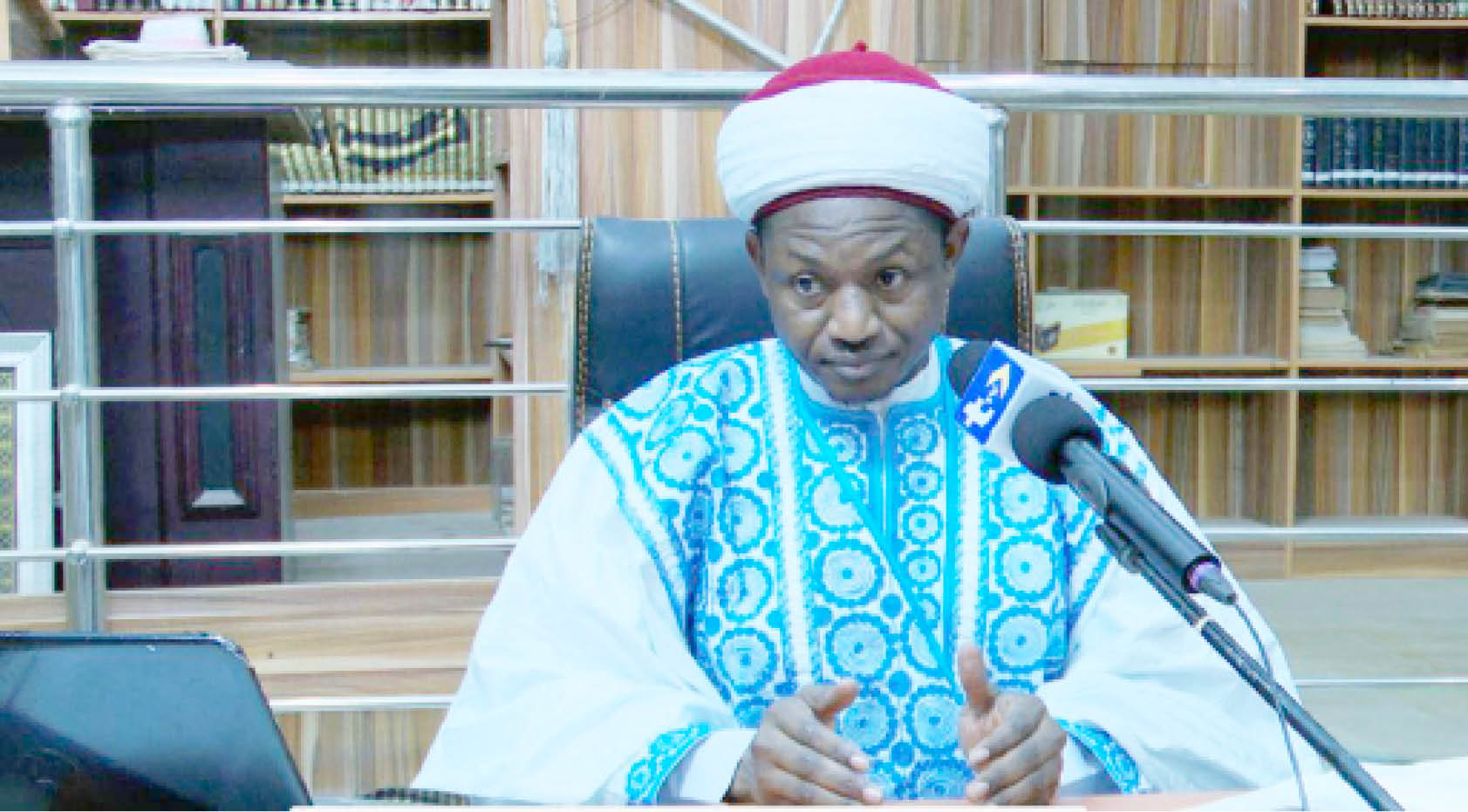Last Saturday, the much talked about debate between Kano-based controversial Islamic scholar, Sheikh Abduljabbar Nasiru Kabara, and other clerics in the state took place.
In an exclusive interview with Daily Trust Saturday and Trust TV, the cleric talked about his major takeaways from it, his next line of action as well as clarification on his controversial nature of preaching. Days after the interview, he was arrested.
Daily Trust: The much talked about debate has come and gone. What are your major takeaways from it?
Sheikh Abduljabbar Nasiru Abduljabbar: My major takeaway from the debate is that it was stage-managed even before the time, including the result and everything. The reasons are obvious, looking at the way virtually all the arrangements earlier agreed on were later altered.
It was agreed to be open, but was later made closed; that it will be broadcast live, but later changed to recorded; that I will be allowed to record, but was later denied; that different judges will be invited from at least four various sects, but later contracted only one whom we later realised was part of the petitioners against me. One of the most extreme among them, for that matter, was made to judge the debate, so how can it be fair?
In the history of debate worldwide, there was never one like this. Everything was premeditated and there was no provision for clarification of the said accusations or defending oneself, all within 10 minutes.
The person asking question was given five minutes, while the person answering it was given only 10 minutes, then the chairman or the judge was given another five minutes to comment. And, this judge from the beginning of the debate till the end, was just attacking me and supporting my opponent. In fact, he never played the role of a judge; he was with my opponents throughout the debate. Whoever watched it will attest to that.
DT: So, you think he was more aligned with them?
Abduljabbar: It was not even about alignment; he was more extreme than the co-debaters. It was after the debate that I got all the facts, including pictures and videos that he is part of them. Even the posts on his Facebook page shows that.
DT: People may still need further clarification on those issues that led to the debate.
Abduljabbar: What actually caused the controversy that later led to the debate was that there are Hadiths (sayings and traditions of the Prophet, PBUH) that were created and injected into Islamic books that are downplaying our Holy Prophet.
Before, only Muslims have access to these books, but with advance in information technology where these books are uploaded on the internet, the infidels now succeeded in adulterating them, setting up channels fighting Islam and promoting Islamophobia. I have known these for quite a while but decided to maintain the status quo, but things have now changed.
This is why I conducted rigorous research, fished out these ‘false Hadiths’ and educate people about them, especially those trying to tarnish his image or trying to portray him in bad image.
So, it is this denial that they think is the offense. When they discovered that people will not be on their side if they present those facts as I did, they adulterated it by cutting and joining parts suitable to them.
When the issue of the debate arose, they changed the plan; instead of discussing topics, they ended up discussing words. If I discuss so many Hadith and concluded on a particular meaning, they just pick that meaning and ask me to show them where it is. Meanwhile the main clip they extracted from was not like that.
I tried as much to clarify, but they insisted I should do so in 10 minutes, which was not going to be enough.
DT: You were heard in one of your audio clips a day after the debate apologising, what exactly are you apologising for?
Abduljabbar: After denying me the right to explain and clarify where I sourced these issues for people to understand, people got confused and concluded that those issues were actually not in those books, that I created them. So, the environment became very hot, people became furious.
Ideally, people will think that everything was alright with the debate because even when I asked of the debate’s terms and conditions, I was told that everything was in the invitation letter, while they were not there.
Those who don’t know all these intrigues, only saw me sitting down, being asked questions and I was responding ‘there was not enough time’, then concluded that those issues were actually from me. So, they became furious and there was tension everywhere. Those close to me suggested that ‘since they were forced to misunderstand you, just tell them you have recanted those issues’ for people to calm down.
My hope and prayer are: if we later win in court, then maybe there could be the possibility of organising another one (debate). I may be given my right to fair hearing where I will clarify everything and confirm to the world that these issues were actually in those books. God forbid, they were not from me. I recanted them not because I have accepted them as mine, but for peace sake.
DT: So, are you planning on going to court over this issue again?
Abduljabbar: Of course, that is what courts of law are meant for. Even before this, we were in court regarding the shutting down of my mosque and denying me the right to preach. The court had even issued an interim injunction directing them to maintain the status quo pending when it will give final verdict, but they failed to comply and still went ahead to organise this debate.
DT: The state government said your apology is not complete as it has not followed the laid down procedures. What will you say about that?
Abduljabbar: I don’t even understand the commissioner that made those utterances anymore. Sometimes, he pretends he is with us, but sometimes shows he is with other clerics. This is not even supposed to come from a learned person like him. Government is not God, so it cannot be asked of forgiveness; talk less of accepting or rejecting it.
He even went ahead to say that the gravity of the offense is not even forgivable. You see, this is even denying a Qur’anic verse, as nowhere has Allah said he will not forgive his servants. “Allah forgives all sins,” is what Allah says in the Qur’an.
DT: After this debate, what will be your next line of action?
Abduljabbar: We have already instituted a legal action challenging the shutting down of my seminaries and the right to preach since the day government decided to announce the measures. The court that even stopped me from talking later exempted the debate from the issues, and all the issues I have been discussing are related to the debate, and that is why I kept talking about them. The battle will continue in the court for now.
DT: We heard that you were invited by the police on Monday. Did you go?
Abduljabbar: I couldn’t go on that day, but I later answered them.
DT: There are reported plans by Kano State government to arraign you for blasphemy, incitement and other sundry offences, what’s your take?
Abduljabbar: As long as the court will be just and fair and give me the right to fair hearing, I have no problem with that. Court cannot decide by hearing from one party. So, I have nothing to fear.
I will explain to them that my preachings are neither trying to attack the Prophet nor the issues created by myself. I was only unjustly misquoted. I am ready to prove to the court beyond reasonable doubt that all the issues I discussed have their sources.
DT: Many people have tagged your mode of preaching as controversial. Do you see yourself as one?
Abduljabbar: How will my preaching not be controversial, after all they have cut and joined it? No one was ever treated the way I was treated. You lecture for three hours and someone will just extract five minutes from it or even look for a different lecture and join. They all did this to me.
But when everything was okay, my audience size was growing every day. If I am actually attacking the Prophet, how will my followers keep increasing in a city like Kano that is very popular worldwide in terms of its love to the same Prophet?
How could they keep growing if I am actually attacking what they love? This is far from being truth.
It was the governor that ordered all the Imams in the state to make sermons and preach against me to incite people. Will the people wait for incitement before they take action if I actually attacked the Prophet? Kano people are not like that. In fact, even after the incitement, it was the opposite that happened. My follower-base has increased and my preaching listenership has peaked.
I keep telling the governor that I don’t hold any grudges against him; that the problem I have with him does not affect his office. He should try and understand me and live peacefully with me. I have nothing against him. All he has been hearing about me politically are not true; I am neither a politician nor fighting for any politician.
DT: And why don’t you maintain the status quo like other scholars?
Abduljabbar: Those other clerics kept quiet because they are not aware of the current trends of the infidels to uncover these issues. Before, these people never draw cartoons to ridicule the Prophet. Muslims failed to understand that these people extracted those things from some of those books I was raising alarm on. But now things have changed and Allah has given me the wisdom to discover that those Hadiths were false.
DT: Lastly, what message do you have?
My message is first to clerics; they should understand that religion is about facts, and there is no way you should compel your understanding on others. I am not the only person working with these books. But, there are other Islamic sects who do not even believe in these books entirely, millions of them.
Shiites for instance are estimated at over 300 million people globally, yet they don’t believe in these books and that has not stopped them from being Muslims, so also the Qur’aniyyuns.
But, whenever I am asked why I don’t keep quiet, I always reply them with: how can we address this problem of undermining Islam by the infidels? Everyone knows about these issues, yet no one is talking about it.

 Join Daily Trust WhatsApp Community For Quick Access To News and Happenings Around You.
Join Daily Trust WhatsApp Community For Quick Access To News and Happenings Around You.


